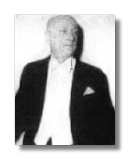
The Internet's Premier Classical Music Source
Related Links
-
Find CDs & Downloads
Amazon - UK - Germany - Canada - France - Japan
ArkivMusic - CD Universe
Find DVDs & Blu-ray
Amazon - UK - Germany - Canada - France - Japan
ArkivMusic-Video Universe
Find Scores & Sheet Music
Sheet Music Plus -
Recommended Links
Site News
Gioachino Angelo

(1899 - 1971)
Composer and conductor Maestro Gioachino Angelo was born in Palermo, Italy in 1899 and died in Ostia Lido – Rome in 1971, where a park has named in his honor. He studied violin with Professor Franco Tufari and composition with Felice Longo and Francesco Cilèa at the Conservatory "V. Bellini" in Palermo. When he was twenty and still living in Palermo, Pietro Mascagni asked him to collaborate on "Massimo"; then in Rome, Umberto Giordano asked him to orchestrate music for the films "Fedora" and "Una notte dopo l'Opera" (A night at the Opera).
Maestro Angelo composed a number of works, some of which have been recorded on "Cetra" and "Voce del Padrone". He wrote nine lyrical operas, and one of them, "L'Ajo nell'imbarazzo", was broadcast by the R.A.I., and "La Coppa di Cipro" was produced in Italy forty-three times from 1954 to 1959 to great public and critical success. Other operas include: "Silvia", "Il dono del Sole", "Fiamme Barbariche", "Mitsuoko", "L'Avvoltoio", "La Boccaccesca" (from a novel of Decameron), and "Frate Sole" a mystic opera in a prologue, three acts, and seven pictures considered by many to be his masterpiece.
Maestro Angelo also composed four ballets: "Il Trenino della neve", "I denari incantati", "Leggenda Satanica" and "Scandalo in Paese" as well as two symphonies, a Mass for two male voices, and a number of scores for famous films like "Ombre Rosse".
Maestro Angelo was a conductor as well as a composer. He led many symphony concerts, including performances for the R.A.I.
Recommended Recordings
Recommendationed Piece
- Recommendation to come…
-













